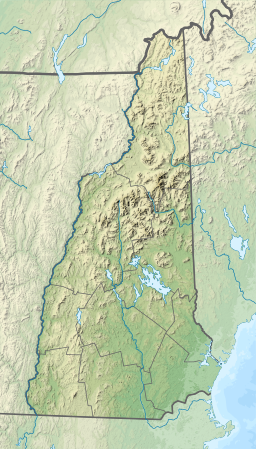Horn Pond is a 227-acre (92 ha) water body located on the border of Acton, Maine, and Wakefield, New Hampshire, in the United States. The lake is both spring-fed and fed by the outflows of Great East Lake to the north and Wilson Lake to the east. Horn Pond's outlet is the Salmon Falls River which forms a natural border between Maine and New Hampshire and empties into the Piscataqua River east of Dover, New Hampshire, and ultimately the Gulf of Maine.
| Horn Pond | |
|---|---|
 View looking west from New Bridge Road in Acton, Maine | |
| Location | York County, Maine; Carroll County, New Hampshire |
| Coordinates | 43°33′43″N 70°57′30″W / 43.56194°N 70.95833°W |
| Type | Oligotrophic |
| Primary inflows | Great East Lake Wilson Lake |
| Primary outflows | Salmon Falls River |
| Catchment area | 1,139 acres (1.780 sq mi) |
| Basin countries | United States |
| Max. length | 1.2 mi (1.9 km)[1] |
| Max. width | 0.4 mi (0.64 km)[1] |
| Surface area | 227 acres (0.92 km2) |
| Average depth | 13 ft (4.0 m) Average transparency: 6.6 m (22 ft) |
| Max. depth | 30 ft (9.1 m) |
| Water volume | 3,155,000 m3 (111,417,773.5 cu ft) |
| Residence time | 0.1 years |
| Shore length1 | 4.8 mi (7.7 km) |
| Surface elevation | 551 ft (168 m) |
| Settlements | Acton, ME Wakefield, NH |
| References | Midas number: 3924 |
| 1 Shore length is not a well-defined measure. | |
Horn Pond is classified as "Potentially Non-supporting" under the New Hampshire Department of Environmental Services' revised water quality standards for oligotrophic lakes. The Horn Pond watershed covers 1,139 acres (461 ha) that is primarily forested (70%). Only 6% of the watershed is developed, with 34% buildable area. The shoreline of Horn Pond is composed primarily of low density houses and camps (51%) and undeveloped shoreline (44%). 70% of the structures along the shoreline are within 50 feet (15 m) of the water's edge.[citation needed]
Horn Pond water quality monitoring has been collected since 1982. During this period, 11 years of secchi disk transparency data, 7 years of total phosphorus (TP) data, 2 years of chlorophyll-a (Chl-a) data, and 5 years of dissolved oxygen (DO) data has been collected. From this data, the median TP concentration is 8.0 parts per billion (ppb) and the mean transparency is 6.6 m (21.7 ft).[citation needed]
The Horn Pond Association has been recently redeveloped and aims to protect and improve the water quality of Horn Pond.[2]
The lake is classified as a warm- and coldwater fishery and contains brook trout, rainbow trout, brown trout, largemouth and smallmouth bass, Eastern chain pickerel, brown bullhead, white perch and bluegill.[3]
See also
editReferences
edit- ^ a b ESRI ArcGIS
- ^ "Archived copy" (PDF). Archived from the original (PDF) on 2012-04-26. Retrieved 2011-12-14.
{{cite web}}: CS1 maint: archived copy as title (link) - ^ "Horn Pond, Wakefield" (PDF). NH Fish & Game. Retrieved August 15, 2014.


